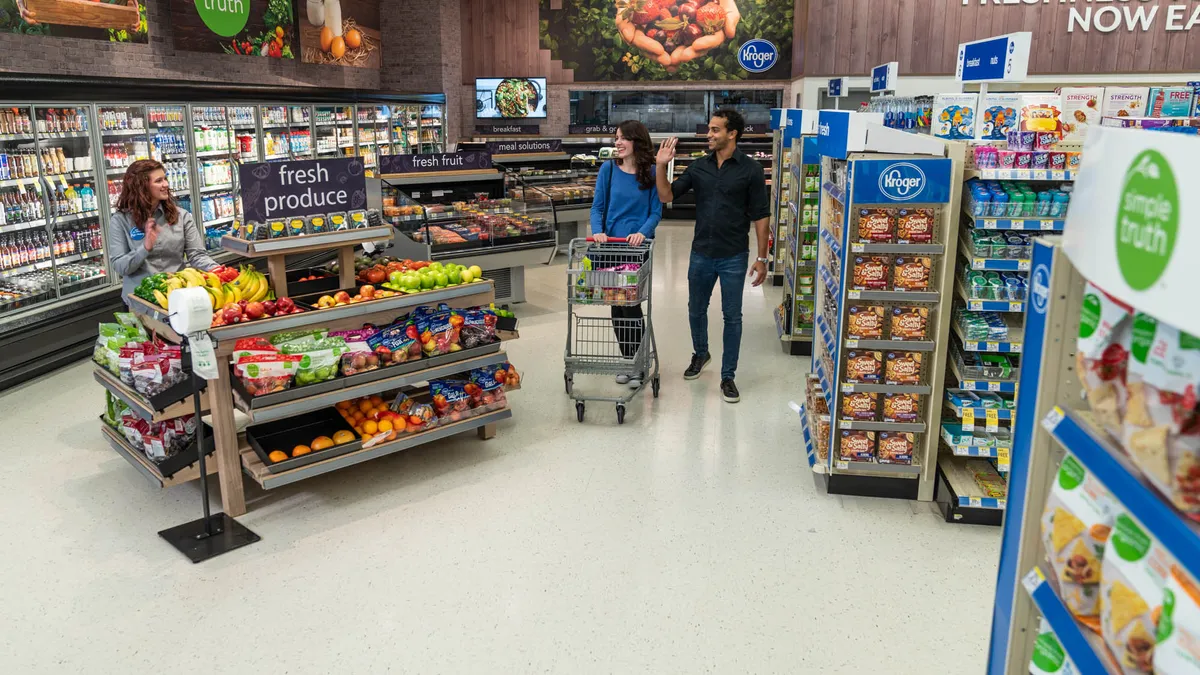Dive Brief:
- Kroger will open mini grocery outlets inside 13 Walgreens stores over the next few months — an expansion of an online order pickup partnership the two companies announced back in October. The first location is currently live at a Walgreens store in Florence, Kentucky.
- Kroger Express markets will offer 2,300 products including fresh produce, meat, dairy and frozen items as well as private label products, including Kroger's Simple Truth brand and Home Chef meal kits. The mini markets will be 4,000-square-feet and take up roughly a third of Walgreens' selling space, according to The Wall Street Journal, which also noted that offerings will not overlap with the drug store's current private label assortment. Each location will also offer pickup options for groceries ordered through Kroger's website.
- Additionally, Kroger announced the rollout of Home Chef meal kits to 65 Walgreens stores in Chicago. Home Chef will run three unique meal kits for the drug store chain and will rotate recipes bi-weekly.
Dive Insight:
Building on its click-and-collect partnership with Walgreens unveiled back in October, Kroger is collaborating with a competitor in a move that, if successful, could spotlight a new revenue opportunity for under-pressure conventional supermarkets.
Drug stores have emerged as supermarket foes in recent years as they've added more food and beverages to their assortments. Walgreens had recently begun trialing options through Chef'd before the meal kit company went under and then found a new buyer, while other drug stores offer fresh produce, prepared meals and more.
Kroger Express outlets expand that food and beverage assortment for Walgreens in ways the pharmacy retailer couldn't do on its own. The deal could draw more customers to stores, boosting revenue for both Walgreens and Kroger. For Kroger, the deal also puts its high-value private brands, including the $2 billion Simple Truth, in front of more shoppers. Kroger also offers Simple Truth to consumers in China through listings on Alibaba's TMall online marketplace.
Widespread expansion of Kroger Express is anything but assured. Kroger is making calculated bets, but it's also adopting more of an experimental mindset as it navigates industry pressures. In order for this partnership to be a success, Kroger will want to see not just healthy grocery sales in Walgreens stores, but greater engagement with its brands and with its online shopping platform that pushes shoppers into its supermarkets.
If Kroger Express works inside Walgreens stores — and even if it doesn't — it's not hard to imagine the grocer putting the format in other places, including office buildings and hospitals. With space for conventional stores limited, mini markets could offer a way for grocers to expand their footprint.
Reaching more consumers in more places is a core focus for Kroger right now as competition and margin pressures tighten. This year the retailer — which Grocery Dive just named its company of the year — has bought meal kit company Home Chef, launched a direct-to-consumer shopping site, unveiled a new clothing line and rapidly expanded its store pickup and delivery services. It also made a huge bet on automated order fulfillment earlier this year when it signed on with e-grocer Ocado to build 20 robot-packed warehouses across the U.S. The first location will go up in Monroe, Ohio, a Cincinnati suburb.
"I think Kroger understands that they have to be much more at the cutting edge of technology, they have to be much more at the cutting edge of really trying to get volumes to come from growth areas," Neil Saunders, managing director with GlobalData Retail, told Grocery Dive in a recent interview.
Alternative formats like drug stores and discounters pose an existential threat to conventional grocers. According to a report from McKinsey & Company, traditional grocers could lose as much as $700 billion globally to competing formats and as many as half of all supermarkets could go out of businesses if retailers don't act.
Creative partnerships have flourished lately as companies across the food retail industry scramble to meet evolving demands for convenience and digital shopping. Meal kit companies have moved into grocery stores. Food delivery companies have partnered with software firms. These partnerships should increase in the months and years ahead, re-drawing the lines between friends and foes in an ever-changing industry.
















